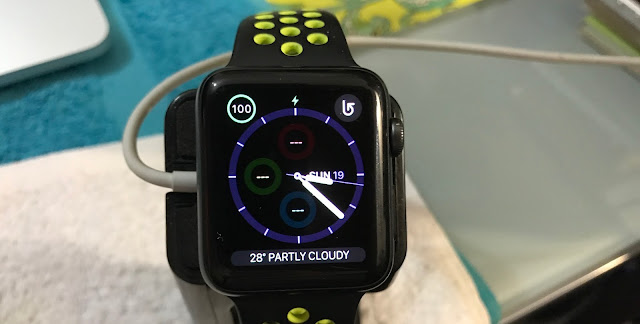 |
| Linzé's iWatch on its charging stand |
It also means that a full-length fantasy or other novel, typically in the order of 100k+ words, can be done in 100 hours. Now we are talking first drafts here. Editing and all the other activities to get a book to publishable quality, are not included in those hours.
So that means NaNoWriMo should take me (at two hours per day) only 25 days to do. These two hours are what I have available on a weekday. If I double that to 4 hours per weekend day then my NaNoWriMo target should have been completed today - the 19th of November. Since I have not achieved the 50k yet, it means that I am not as efficient as I would like to believe. Based on current performance, and present word count (41010 words) I would then complete the requisite 50k words in two days, the 21st.
Crunching a few more numbers, it means that I have only been 90% efficient at using my time this November. Using 30 days out of a potential 365 days of writing is not a large enough sample to draw any conclusions.
So I went to my word count spreadsheet for the year to see how efficiently I have used my time this year, so far. To do the math correctly, I can therefor only count the days until today - 19 November. This means my calculations must be done for 323 days if I include today.
So here is what my numbers for the 323 days of 2017 look like:
Writing: 208130 words
Editing: 126.5 hours
Until now there were 45 full weekends (ie, 2 days) plus one weekend day (today). I counted Saturdays, but it makes no difference since 1 January fell this year on a Sunday.
So that gave me 323 days x 2 hours per day + 90 weekend days x 2 additional hours per weekend day + today's 4 hours = 830 available writing hours
At 1000 words per hour, I should have written 830 000 words this year!
Let's work with hours; the numbers are just smaller to use for the calculations. Based on the 1000 words per hour premise, I had been writing for 208.1 hours up to today. Add the editing (because I can only do one of the two at a time) my total hours spend on writing projects so far were 334.6 hours.
Now my efficiency does not look that good anymore, does it? Crunching the numbers one last time gives me 334.6 / 830 = 40%.
I have used only 40% of the time I have allocated for writing this year. If this does not bother you, you can rest assured, it bothers the freaking daylight out of me!
To be honest, I type about 1200 words in an hour, which is not helping my case at all.
So where did things go wrong? Alternatively, did they go wrong at all? Am I deluding myself into thinking that writing for two hours per day is what is happening?
Reassessing my writing time slash writing life:
1. I don't suffer from writer's block, never have. So if I don't write, there must be other reasons for not writing - exhaustion, illness, and other obligations. These things happen, I am only human.
2. I read a lot. Since I work full-time, I have to choose between writing or reading in my spare time. Reading does not make me feel guilty for not writing, so those hours (which I have not kept track of) probably account for a significant portion of my writing hours not used for writing. To date, I have read 45 books - not nearly as many as I have done in recent years.
3. Studying. In September and October, I did a management course (on my own time) which required 60 hours of studying and assignments. It inspired me to change direction in my professional life. That means that I am now studying towards my diploma in Life Coaching. Again, hours taken away from my writing time.
4. Art. I have made it a point to do more art this year, and I have. The exact hours recorded are lost in a file that I cannot recover, but I did not spend them writing when I used pencils or paint brushes.
As I sit reading what I wrote here, I realise that I haven't done that badly at all. I completed Camp NaNoWriMo both times on target, I am about to finish the 50k version in the next two days, and while my fourth novel is late, it will still be published this year.
However, I have to ask: was I only 40% efficient? Judging by the numbers, I would have to say yes. However, this is my life, and while numbers don't lie, they simply cannot tell the whole story with all its plotlines, intricacies, and surprises.
Time is the most precious resource we have, and maybe I shouldn't use the number of words I write as a measure of how I spend my time. At least, not as the only parameter. A qualitative element could be more useful. Was that hour, day or week's time happy, satisfactory or fulfilling instead. Something to consider as the approach of a new year lends itself to a new way of doing things.
Until next time!
Linzé
Until next time!
Linzé













